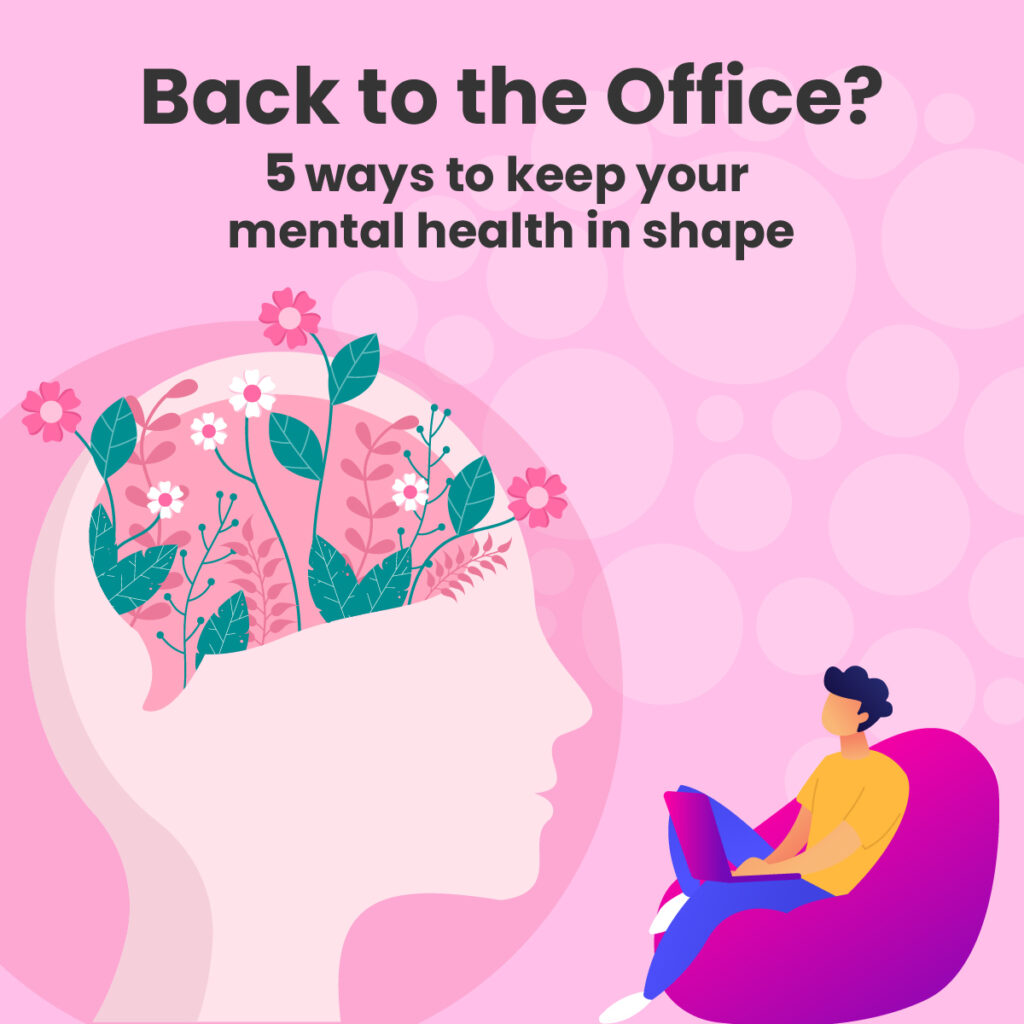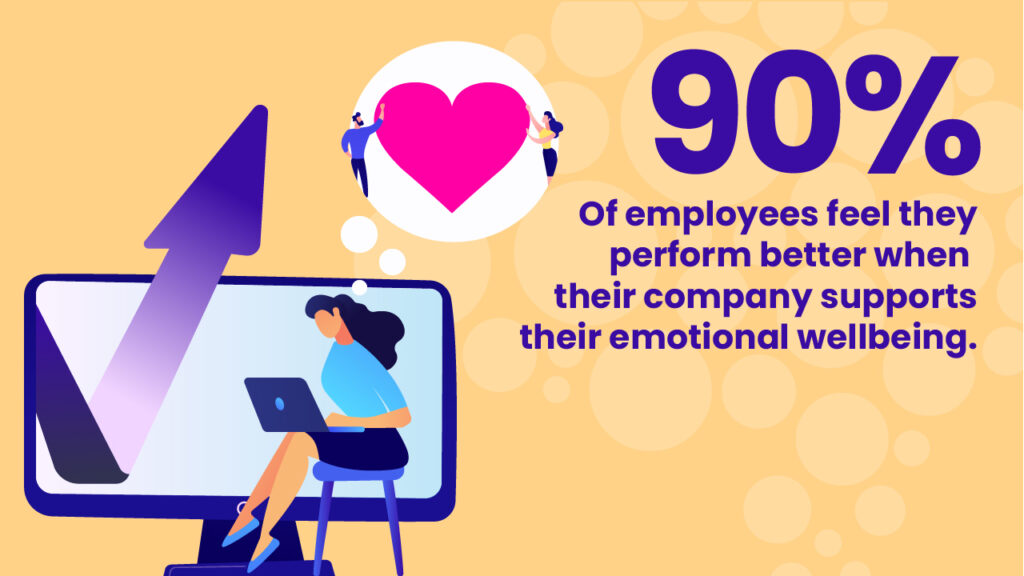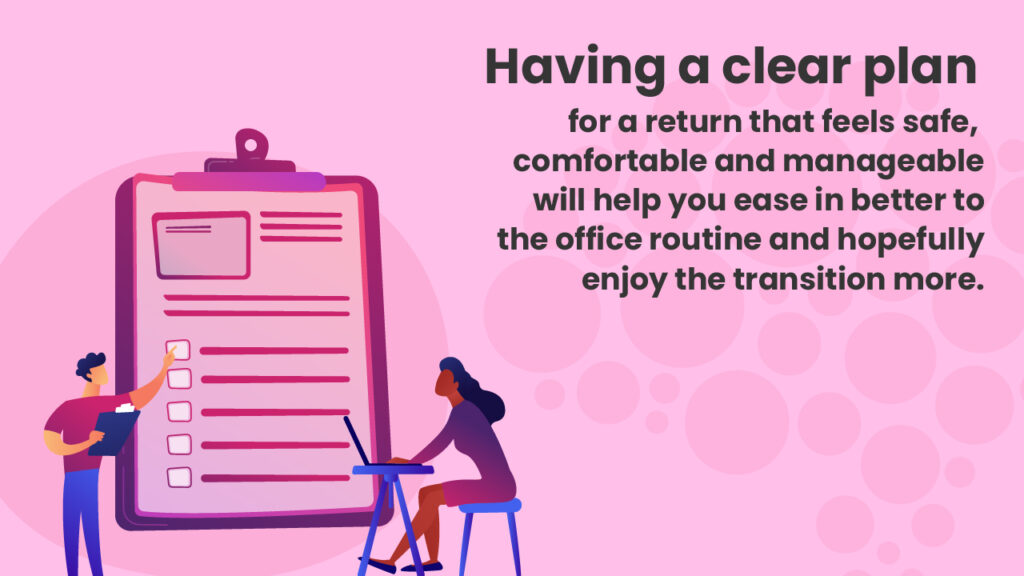
Back to work? 5 ways to keep your mental health in shape
Many of us have spent well over a year working remotely following the outbreak of the COVID-19 pandemic. However, it seems that most employers are starting to re-open their offices and are currently speaking to staff about their plans to return.
Whether you’re a fan of working from home, or not, chances are you’ll have mixed feelings about returning to a full-time office role once again. Especially with everything that has happened.
You might be quite excited about the prospect of meeting with colleagues in-person and enjoying a cuppa by the printer once again. Or, you might be feeling anxious and overwhelmed about the thought of moving away from your kitchen table and back to a real workspace with lots of people around you. Perhaps you’re feeling a mixture of both of these emotions – and that’s completely to be expected.
To help you make the transition a little easier, we’ve put together a list of 5 suggestions. Hopefully, these ideas will help you to feel calmer as you ease back to the office and avoid anxiety and stress as much as possible.
Plan your ‘returning back’ approach
It seems many companies are offering employees a phased approach to return to the office. Starting with two or three days in the office for the first few weeks seems like a sensible idea to ease back into the swing of things without too much of a shock to the system. If your manager hasn’t yet spoken with you about their ideas for the team’s return, then now might be a good time to check in with them – ahead of Boris’ announcements for the suggested 19th July comeback.
Many of us have become used to our working-from-home routines. Perhaps the lack of an office commute means that you’re taking a pre-work run or cycle every morning, or maybe it means that you can be there to drop off your kids or collect them after school. Therefore, it’s important to think about how you can still incorporate these important things into your new way of working, speaking to your manager if necessary about flexible working options.
Having a clear plan for a return that feels safe, comfortable and manageable will help you ease in better to the office routine and hopefully enjoy the transition more.
Keep an open mind
A lot can happen in a year, and especially this past year! Who would’ve actually believed you if you’d have guessed what we were all about to go through as a global nation. People’s feelings and experiences of the pandemic will all be very different, and it’s likely that some of us will have changed the way we think, work and act as a consequence.
Therefore, as you prepare to meet with colleagues and clients face-to-face once again, it’s best to go back with an open mind. The mates that you may have always gone to the pub with after work might no longer feel comfortable doing so. Or the people that you always turned to for advice and support might now need your support more than you need them.
It’s going to be a strange time for everyone as we work out how the new office day will look, so be open to new ways of working and understand that things might never be quite the same.

Take control of your wellbeing goals
A 2019 study found that 90 percent of employees feel they perform better when their company supports their emotional wellbeing. However, the same study found that only 41 percent of employers routinely ask about their employers’ wellbeing during one-to-one meetings.
Therefore, as you return to the office, now might be the time to consult with your manager or supervisor about your own wellbeing goals i.e. what you feel you need in order to maintain good mental health at work. Especially given the effects that they pandemic might have had on you.
This might involve requesting a desk that is not too close to the door with many people coming in and out or asking to be sat close to a window with access to fresh air. Alternatively, it might involve asking if you can sit out of certain meetings with many people involved – with an option to attend via Zoom for a while, just until your confidence grows.
Sharing your wellbeing goals, worries and priorities with your manager as soon as you return will help to foster accountability and encouragement going forward.

Make the most of your lunch hour
Are you one of the 56% of office workers who - pre-COVID - would sit at their desks during lunch break with a packet sandwich, scrolling their way through their emails and typing one-handed replies while simultaneously feeding themselves with the other hand?
Well, if so, then now’s the time to change these old habits with a fresh approach to work breaks.
Adding moments of leisure to your workday can help to improve your body’s response to stress, lowering your levels of the cortisol (stress) hormone and keeping your heart-rate at a healthy level. Regular breaks doing something you love or an activity that makes you happy can improve your mood, your sense of fulfilment, and overall wellbeing, both immediately and also in the long term too.
Therefore, ditch your desk and head outside for a brisk walk to get some fresh air. Focus on your breath and take a moment to look around you and appreciate the sights and sounds of the outside world. Even if the weather isn’t great, grab a brolly and your raincoat and at least walk to the nearest park to see some green space.
Other ways to enjoy your lunch break could include taking yourself to a quiet space in your building to listen to your favourite playlist or a new podcast. You could learn a new skill, language or listen to a motivational speech to restore your energy for the afternoon.
Listening to comedy is a great way to boost your mood, on the 7th July, we hosted our first Lunchtime Laughter sessions. Award-winning comedian and mental health advocate Harriet Dyer hosted Cademi’s first-ever Lunch time Laughter session, so be sure to register and watch the recording of the first event.
Write down how you feel
Journaling has been noted by many mental health experts as a positive way to address your anxieties. Clinical researchers call this the ‘name it to tame it’ strategy because it actually slows down the brain’s negative response to stress by putting it into words. It’s thought that by labelling an emotion, it can help to regulate stress. Essentially you are informing yourself of the feelings you’re experiencing rather than overwhelming yourself with them internally, which makes sense.
Therefore, at the end of each working day, try to set a time before bed to get out your notebook and put pen to paper. Note down the things that have annoyed or stressed you that day. Reading them back might make you realise the concerns are less overwhelming than they originally appeared.
Be sure to also write the things that have been positive in your day. The things you liked, enjoyed or benefited from. Doing so might help you attract more of these positive experiences into your working day going forward.
At Cademi, we are big on bettering mental health. That’s why we’re the first and only Holistic Learning Platform to balance upskilling with personal wellbeing.
If you want to help your business and people tackle the challenges of modern-day life, then get in touch to take advantage of our free 14-Day trial to see the benefits for yourself.
